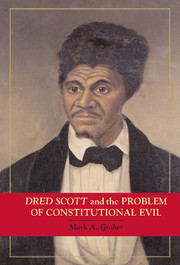Crossref Citations
This Book has been
cited by the following publications. This list is generated based on data provided by Crossref.
Thomas, George
2004.
Recovering the Political Constitution: The Madisonian Vision.
The Review of Politics,
Vol. 66,
Issue. 2,
p.
233.
Thurston, Thomas
2007.
SLAVERY: ANNUAL BIBLIOGRAPHICAL SUPPLEMENT (2006).
Slavery & Abolition,
Vol. 28,
Issue. 3,
p.
407.
Novkov, Julie
2007.
Mobilizing Liberalism in Defense of Racism.
The Good Society,
Vol. 16,
Issue. 1,
p.
30.
Keck, Thomas M.
2007.
Party Politics or Judicial Independence? The Regime Politics Literature Hits the Law Schools.
Law & Social Inquiry,
Vol. 32,
Issue. 2,
p.
511.
Novkov, Julie
2007.
Mobilizing Liberalism in Defense of Racism.
The Good Society,
Vol. 16,
Issue. 1,
p.
30.
Graber, Mark A.
2008.
The Countermajoritarian Difficulty: From Courts to Congress to Constitutional Order.
Annual Review of Law and Social Science,
Vol. 4,
Issue. 1,
p.
361.
Osborn, Ronald
2008.
William Lloyd Garrison and the United States Constitution: The Political Evolution of an American Radical.
Journal of Law and Religion,
Vol. 24,
Issue. 1,
p.
65.
Einhorn, Robin L.
2008.
Slavery.
Enterprise and Society,
Vol. 9,
Issue. 3,
p.
491.
Gross, Ariela
2009.
Law and the Humanities.
p.
416.
2009.
Law's Allure.
p.
95.
Ewald, Alec
and
Rottinghaus, Brandon
2009.
Criminal Disenfranchisement in an International Perspective.
p.
1.
2009.
Law's Allure.
p.
15.
2010.
Freedom Bound.
p.
1.
Miller, Lisa L.
2010.
The Invisible Black Victim: How American Federalism Perpetuates Racial Inequality in Criminal Justice.
Law & Society Review,
Vol. 44,
Issue. 3-4,
p.
805.
2010.
Freedom Bound.
p.
509.
2010.
Freedom Bound.
p.
401.
Stedman Jones, Gareth
and
Claeys, Gregory
2011.
The Cambridge History of Nineteenth-Century Political Thought.
Den Otter, Ronald C.
2011.
To Deviate or Not to Deviate.
Res Publica,
Vol. 17,
Issue. 4,
p.
405.
2011.
American Politicians Confront the Court.
p.
170.
Schmitt, Jeffrey M.
2011.
The Antislavery Judge Reconsidered.
Law and History Review,
Vol. 29,
Issue. 3,
p.
797.



